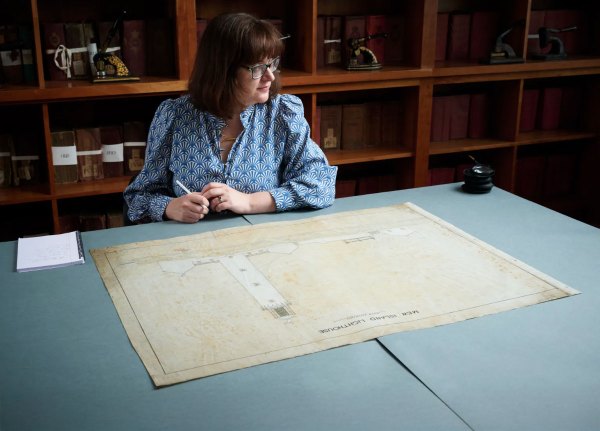Fáiltíonn an Chartlann Náisiúnta roimh an deis ár dtaifid a chur i láthair i scannáin agus ar theilifís. Mar sin féin, ciallaíonn cineál ár mbailiúchán go gcaithfimid ceisteanna cóipchirt, caomhnaithe agus slándála a bhreithniú.
– Ní féidir linn rochtain ar ár mbailiúcháin uile a ráthú i gcónaí
– Ní cheadaítear scannánaíocht ar chúlra le húsáid le haghaidh agallaimh amháin
– Ní féidir doiciméid bhunaidh a thógáil amach as an gCartlann Náisiúnta ar mhaithe le scannánaíocht in imthosca ar bith
Chun cuairt a thabhairt ar an gCartlann Náisiúnta beidh ticéad léitheora ag teastáil uait.
Cead maidir le scannánaíocht a iarraidh
Ní mór duit fógra 15 lá oibre ar a laghad a thabhairt chun cead maidir le scannánaíocht a iarraidh. Ní féidir dátaí a chur in áirithe ach amháin nuair a bheidh foirm iarratais chomhlánaithe faighte againn. Nuair a bheidh cead tugtha, gheobhaidh tú ríomhphost ina ndeimhneofar dáta, am agus costas na scannánaíochta . Ar chúiseanna slándála beidh ort ainmneacha na foirne a thabharfaidh cuairt a sholáthar.
Áirítear leo siúd:
- Láithreoirí
- Na daoine a cuirfear faoi agallamh
- Taighdeoirí
Más gá duit d’áirithint a chealú, iarrtar ort é sin a chur in iúl dúinn roimh ré.
Roimh duit dul i mbun scannánaíochta
Is ann do roinnt rudaí ar chóir duit iad a eagrú roimh duit dul i mbun scannánaíochta.
Na doiciméid a ndéanfar scannánaíocht orthu a shainaithint
Ní mór duit an doiciméad/na doiciméid ar mian leat scannánaíocht a dhéanamh orthu a shainaithint. Ní féidir leis an gCartlann Náisiúnta an obair seo a dhéanamh thar do cheannsa. Is féidir lenár bhfoireann comhairle a chur ar fáil maidir leis na bailiúcháin taifead is ábhartha do do léiriúchán.
Doiciméid a ordú
Tá uimhir thagartha comhaid ag gabháil le gach doiciméad agus ní mór é a chur isteach le d’iarratas maidir le scannánaíocht. Déanfaimid na doiciméid seo a ordú lena chinntiú go mbeidh siad réidh le haghaidh scannánaíochta ar an lá a comhaontaíodh. Ní féidir aon doiciméid bhreise a ordú lá na scannánaíochta.
- Is féidir leat suas le deich ndoiciméad a ordú in aghaidh an tseisiúin scannánaíochta
- Níor cheart doiciméid a úsáid ach le haghaidh ábhair, seachas mar prapaí sa chúlra
Chun cabhrú leat na taifid a bhfuil suim agat iontu a shainaithint, déan cuardach in ár gcatalóg ar líne agus bain úsáid as na háiseanna aimsithe inár Seomra Léitheoireachta.
Baill foirne a chur faoi agallamh
Molaimid do chriúnna a láithreoirí nó a dtaighdeoirí féin a thabhairt leo. Más mian leat agallamh a chur ar bhall foirne de chuid na Cartlainne Náisiúnta faoinár dtaifid, ní mór duit é sin a shocrú linn roimh ré.
Rochtain
Ní sholáthraímid rochtain ar an stór (limistéar stórála doiciméad). Cé go ndéanfaimid gach iarracht freastal ar do riachtanais scannánaíochta, tabhair faoi deara gur áiteanna oibre iad seo agus i gcásanna áirithe, d’fhéadfadh go gcuirfí isteach ar an scannánaíocht agus ar an taifeadadh ó am go h-am.
Maoirseacht
Is cartlanna ar leith ár gcartlanna agus tá gá le srianta maidir leis an gcaoi ar cheart iad a láimhseáil. Is furasta damáiste a dhéanamh do dhoiciméid agus ní mór iad a láimhseáil a laghad agus is féidir Beidh ball foirne ar fáil i rith na scannánaíochta lena chinntiú go láimhseáiltear na doiciméid i gceart agus go leanfar dea-chleachtais chartlannúcháin.
Amanna scannánaíochta
Luan go hAoine:
- 9.30 r.n.–12.30 i.n.
- 1.30 i.n.–4.30 i.n.
Caithfidh an criú imeacht ón láthair faoi 5 i.n.
Is féidir scannánaíocht lasmuigh d’uaireanta oibre a shocrú ach ní mór é sin a shocrú tamall maith roimh ré agus d’fhéadfadh costais slándála breise a bheith i gceist.
Rialacha maidir le scannánaíocht
– Ní cheadaítear bia ná deoch (lena n-áirítear uisce, guma coganta ná milseáin) in aice leis na doiciméid
– Caithfidh an criú fanacht leis an mball foirne agus a gcuid pasanna cuairteoirí a chaitheamh agus iad i mbun scannánaíochta san fhoirgneamh
– Forchoimeádann an Chartlann Náisiúnta an ceart deireadh a chur leis an scannánaíocht tráth ar bith má bhíonn imní ar an mball foirne atá i mbun maoirseachta nach bhfuiltear ag cloí leis na socruithe comhaontaithe
Caithfidh an fhoireann seo agat rialacha an tSeomra Léitheoireachta a leanúint i gcónaí.
Táillí agus ceadúnú
Is é €130 in aghaidh an lae nó €65 in aghaidh leathlae an ráta scannánaíochta atá i gceist leis an gCartlann Náisiúnta. Áirítear leis an gcostas seo taifid a aimsiú, a ordú, a chaomhnú agus a tháirgeadh le haghaidh scannánaíochta agus láithreacht ball foirne a chaithfidh a bheith ar an láthair ar chúiseanna slándála. Is é €65 an costas ar chead chun doiciméad a tháirgeadh i gcló, ar an teilifís nó ar an idirlíon. Is é €200 an ceadúnas chun cóip de dhoiciméad a dháileadh ar feadh tréimhse nach faide ná 7 mbliana. Nuair a bheidh an scannánaíocht déanta, seolfaidh an Chartlann Náisiúnta sonrasc chugat le haghaidh na dtáillí arna dtabhú, agus ní mór an sonrasc sin a íoc laistigh de 30 lá oibre.
Creidiúnú d’ábhair foinse
Ní mór creidiúint a thabhairt don Chartlann Náisiúnta mar fhoinse na dtaifead ar an scáileán agus sa script le linn an chraolta. Má úsáidtear íomhánna i gcló, ní mór tagairt iomlán an doiciméid a lua. Mar shampla, An Cartlann Náisiúnta, DFA/13/2/1.
Meán shóisialta
Forchoimeádann an Chartlann Náisiúnta an ceart an seisiún scannánaíochta, an t-ábhar atáv ann agus tagairtí do dhoiciméid a thaispeáint ar a hardáin ar na meáin shóisialta, agus an clár á chraoladh nó ina dhiaidh sin. Toileann an comhlacht scannánaíochta/léiritheoir gur féidir grianghraif a thógáil le linn na scannánaíochta le húsáid go heisiach chun críocha na meán sóisialta.
Íoslódáil ár bhfoirm iarratais maidir le scannánaíocht
